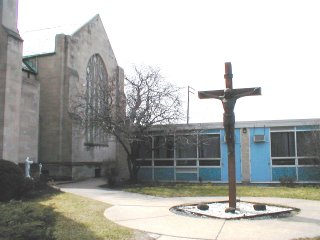 On this day in 1995 I was installed as the Fifth Pastor of Zion Church. So it's an anniversary of sorts.
On this day in 1995 I was installed as the Fifth Pastor of Zion Church. So it's an anniversary of sorts.I must admit that, personally, it is a rather bittersweet anniversary. What is sweet is way Zion has embraced me--and I them. It is better than I could have imagined when (with no little trepidation) I moved my family to Detroit eleven years ago. Zion's kindness, love, affection, longsuffering, and generosity seemingly knows no limits.
Our relationship is as it should be--familial. Since the beginning, they have honored me by calling me "Father," and never once have they been taken aback when I have addressed them as "my beloved" or "my little children." Even in the midst of the few squabbles (which, truly, have been few and far between), that mutual love has never dissipated. I have tried hard to show them the same respect they have consistently shown me, and fear that I have failed to live up to the standard they have set.
This is the sweet, and for it they will ever be the parish I will always love.
But in this life, with the sweet often comes the bitter. What has been most bitter has nothing whatsoever to do with Zion or the people of Zion. Rather, it has to do with where Zion lives and swims.
From our vantage point, we have seen the continued disintegration of both the city we call home and the synod we call our own. Both have disintegrated in ways I could not have envisioned or even imagined 11 years ago. For, when I moved here, it seemed that Detroit was in a renaissance and the LCMS was returning to faithfulness.
Regrettably, Detroit is no longer in a renaissance. Despite much talk and some good efforts, while the downtown looks better, the neigbhorhoods have gotten much worse. The biggest decline is in basic city services--the most basic being police protection. The reasons for decline are too numerous and too complex to list, but surely it is not helped by selling the city's future and soul to casinos coupled with a mentality of impoverishment and a governmental structure that, by its very nature, resists neighborhood improvement.
More devastating than the decline of city is the ruination of the LCMS. Like modern day Detroit, the LCMS has always been structurally unstable. It began as a coalition between two disparate groups in the attempt to revive confessional Lutheranism. On the one side were the Saxons, led by C. F. W. Walther, which attempted a repristination of the era known as "Lutheran Orthodoxy." On the other side were the Bavarians, sent by J. K. Wilhelm Löhe, which attempted a return to a liturgical confessionalism. In the intervening years, both groups have been overrun by what their leaders feared--American evangelical pragmatism. In the LCMS, this has resulted in a Lutheranism that has deserted any pretense to its catholic heritage, is essentially antinomian, and liturigically adheres quite ferociously to adiaphronism. Most devastating of all, however, is the abandonment of any meaningful ecclesiology.
Through the years, under the influence of her Pastors, Zion has manfully attempted to be a paragon of what a Lutheran congregation should be. In the process, it has attracted a small gaggle of admirers and an even smaller collection of imitators. Zion has also fended off any number of detractors and critics ("confessionals" or otherwise) who have been all too willing to attack or disparage its efforts. And so Zion has become little more than a symbol of what could be and, realistically, has devolved into an "experiment."
All of that was managable while the LCMS retained some semblance of liturgical integrity (or, at least, what passes for "liturgical integrity" in post-reformation "confessional" Lutheranism). However, the LCMS long since lost any such semblance and, predictably, the result has been an increasingly downward spiral into least-common-denominator protestantism. For Zion this means that, while it remains faithful as a parish and (one hopes) has grown in its catholic understanding, it has effectively become more and more isolated while remaining in fellowship with those who either wish its demise or tolerate its "eccentricities." The practical result is that very few members of Zion ever go elsewhere within the LCMS (either when they move or when they vacation), and if they do so out of loyalty, they feel deprived if not cheated.
These observations could be passed off as nothing more than the disappointments of a parish priest who struggles with bearing the cross were it not for the fact that he and his parish remain in communion with those who have, at the least, abandoned their heritage or, at the most, slidden into heresy. For unlike Detroit, the problems in the LCMS have declined beyond matters of discipline and basic services. At least, that's how it looks as this priest ruminates on this day--which makes the anniversary ever so bittersweet.
No comments:
Post a Comment